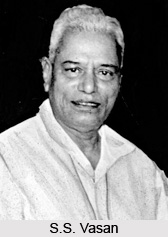 After a promising debut during the Silent Era, marked mainly by `serious` or romanticized mythologies, Tamil cinema emerged as a veritable entertainment industry in 1929, with the creation of General Pictures Corporation in Madras. During the 1930s, a number of studios came into being, not only in Madras, but also in Salem, Madurai and Coimbatore and other places in South India. By the end of that decade, south Indian cinema possessed an infrastructure that enabled it to become autonomous of Bombay and Calcutta. Most Tamil films were, in fact, multilingual productions, with versions in Telegu, Malayalam and Kannada until film production centers were established at Hyderabad, Trivandrum and Bangalore. The Tamil directors with their talent and finesse restructured the shape of Tamil cinema in India.
After a promising debut during the Silent Era, marked mainly by `serious` or romanticized mythologies, Tamil cinema emerged as a veritable entertainment industry in 1929, with the creation of General Pictures Corporation in Madras. During the 1930s, a number of studios came into being, not only in Madras, but also in Salem, Madurai and Coimbatore and other places in South India. By the end of that decade, south Indian cinema possessed an infrastructure that enabled it to become autonomous of Bombay and Calcutta. Most Tamil films were, in fact, multilingual productions, with versions in Telegu, Malayalam and Kannada until film production centers were established at Hyderabad, Trivandrum and Bangalore. The Tamil directors with their talent and finesse restructured the shape of Tamil cinema in India.
During the 1940s the Madras film industry took the battle to Bombay with productions in Hindi, like, Chandralekha, directed by the famous Tamil director, SS Vasan. It was the biggest box office hits of its times. This film presented the very ingredients that, until recently, were considered indispensable for the commercial success, such as, comedy, fights, songs and dances.
The talkie came to South Indian films comparatively late, in 1934. Probably the greatest of the Tamil director of this time was Krishnaswamy Subramanyam (1904-71). He began as a screenplay writer at Associated Films, the company created by a great actor-star of the Silent Era, Raja Sandow. Subramanyam made his reputation with the box office success in Pavalakkodi (1934), with its 55 songs, before turning attention to some more serious, non-mythological subjects. He was involved with a number of productions including Balayogini (1936), Thyagabhoomi (1939) and others. Thyagabhoomi was the biggest hits in the 1930s.
In 1937 another great Tamil director, K. Amarnath presented a sort of Robin Hood story, Minnalkodi. In this film a young woman, a victim of injustice, steals from the rich to aid the poorer section of the society. Besides this the mythological films are a southern specialty. These were especially drawn from Ramayana. Sundarao Nadkarni`s mythological Bhukailasa (1938) is one instance of this. He also made Haridas (1944) featuring the exquisite singer, Rajkumari. The film ran for 133 weeks in Madras.
Murugadasa, still reckoned as one of the great Tamil directors who has been given the credit to harmonize mythology with modernism. One of his mythological but a complete invention this time, was Venuganam.. It was centered on its heroine`s worship of Lord Krishna and included some magnificent songs. The director also was involved with Mahamaya (1944). R Padmanabham, a pioneer of the southern film industry, who founded Associated Films Studio in Madras in 1928, made around 20 films. Of these films the most memorable one is Raksharekha in Telegu (1949), starring the prolific A Nageshwara Rao and the beautiful Anjali Devi.
The resolutely reformist Velaikari, directed by ASA Swamy, the popular Tamil director was based upon an extremely popular play written by C. N. Annadurai.
Mention must be also made of the great Tamil director B. N. Rao and his Gumastavin Penn. It was a somber melodrama about troubled marriages and one of the first attempts at realism in Tamil cinema. Finally there was the actor-director-producer, L.V. Prasad, a sound and prolific professional who worked in Madras after a long stint in Bombay. As a rule his films were shot in several languages simultaneously, such as, Hindi, Telegu, Kannada and Tamil. His career best movie is Grihapravesham (1946), a satire on feminism. Another film, Manohara was a fantasy supposedly set in the 11th century, during the reign of the
Chola Empire.
A cult film that must be singled out as an important cultural and political landmark of `Dravidian Nationalism` is Avvaiyar (1953). A musical and religious film, a celebration of Tamil identity, it was produced by the owner of Gemini Studios, S. S. Vasan and directed by the prominent Tamil director, K. Subbu.
At this point, even the most commercial south Indian films had begun to assume the characteristics that would for long be predominantly elongated-mythological themes, political themes, social themes, quasi-historical themes, folklore and a disproportionate importance attached to songs, music and dance.